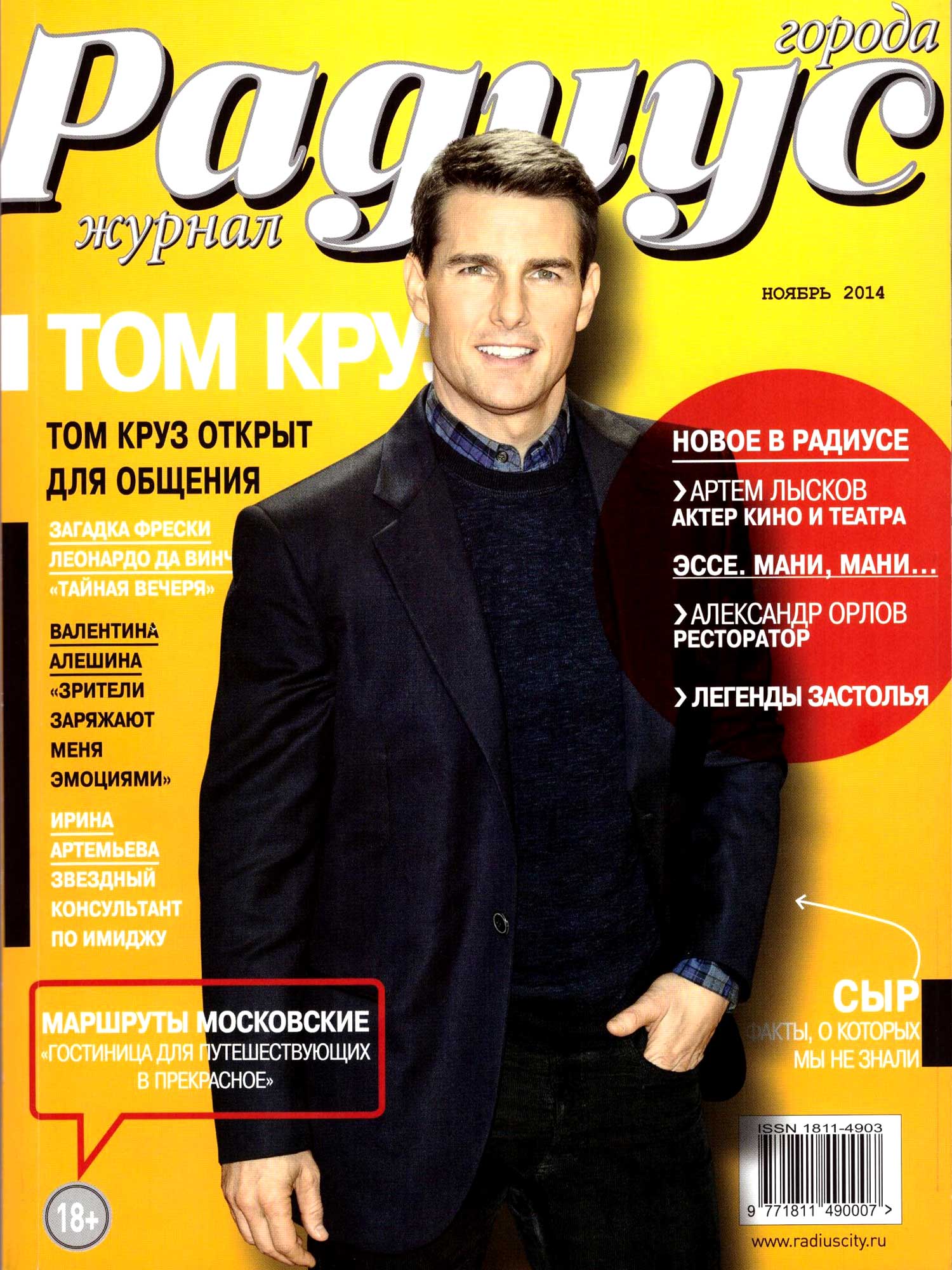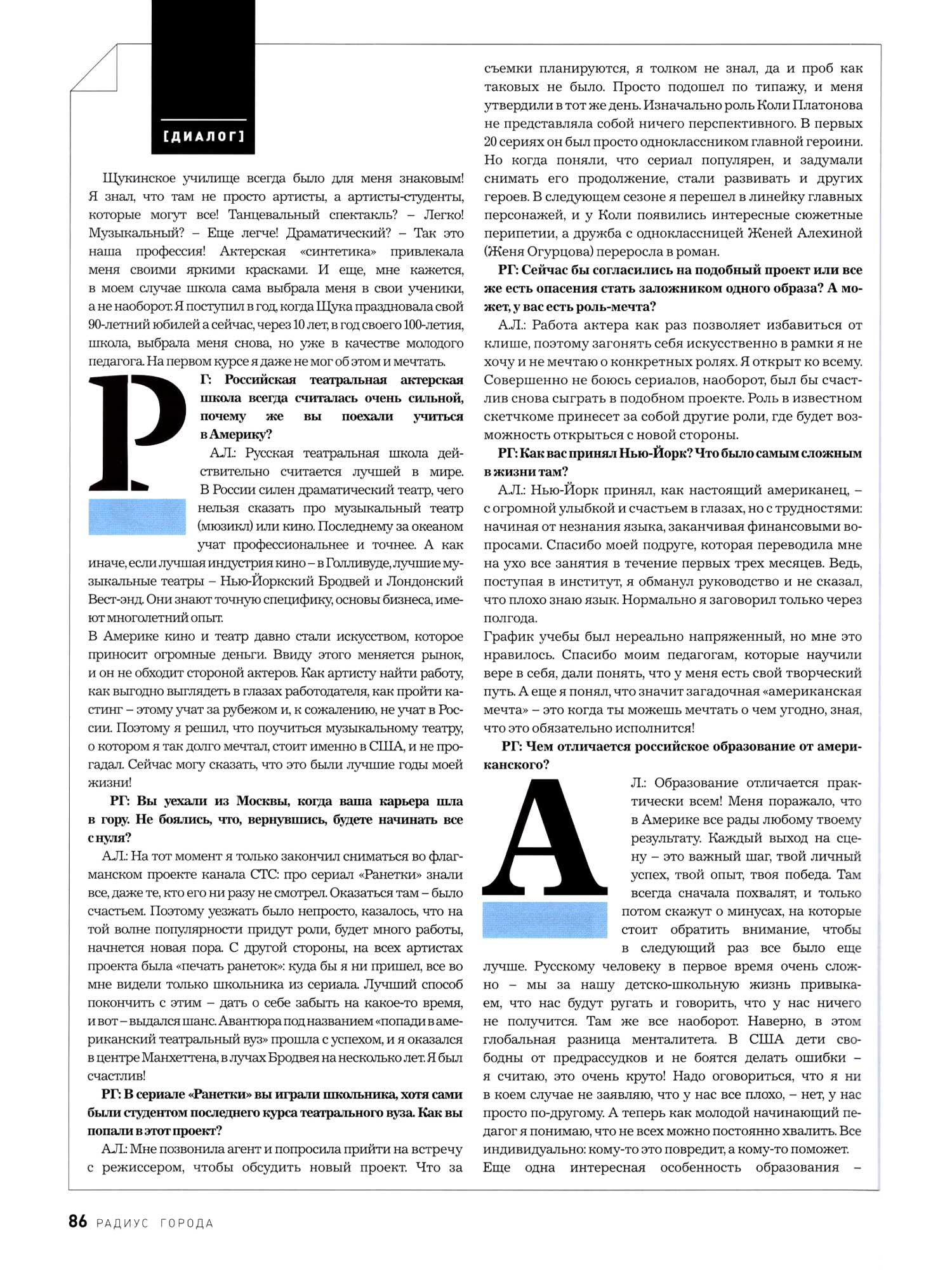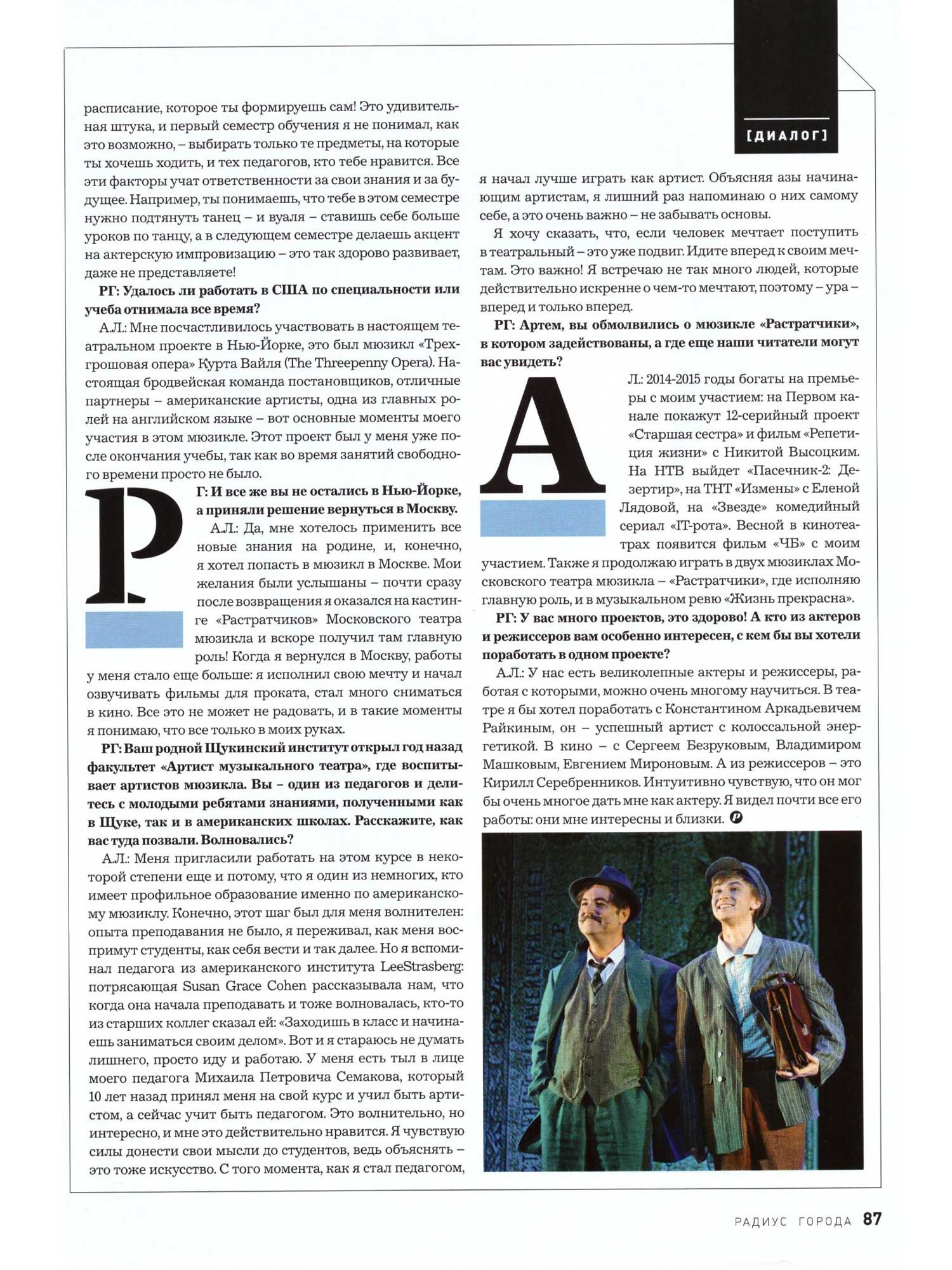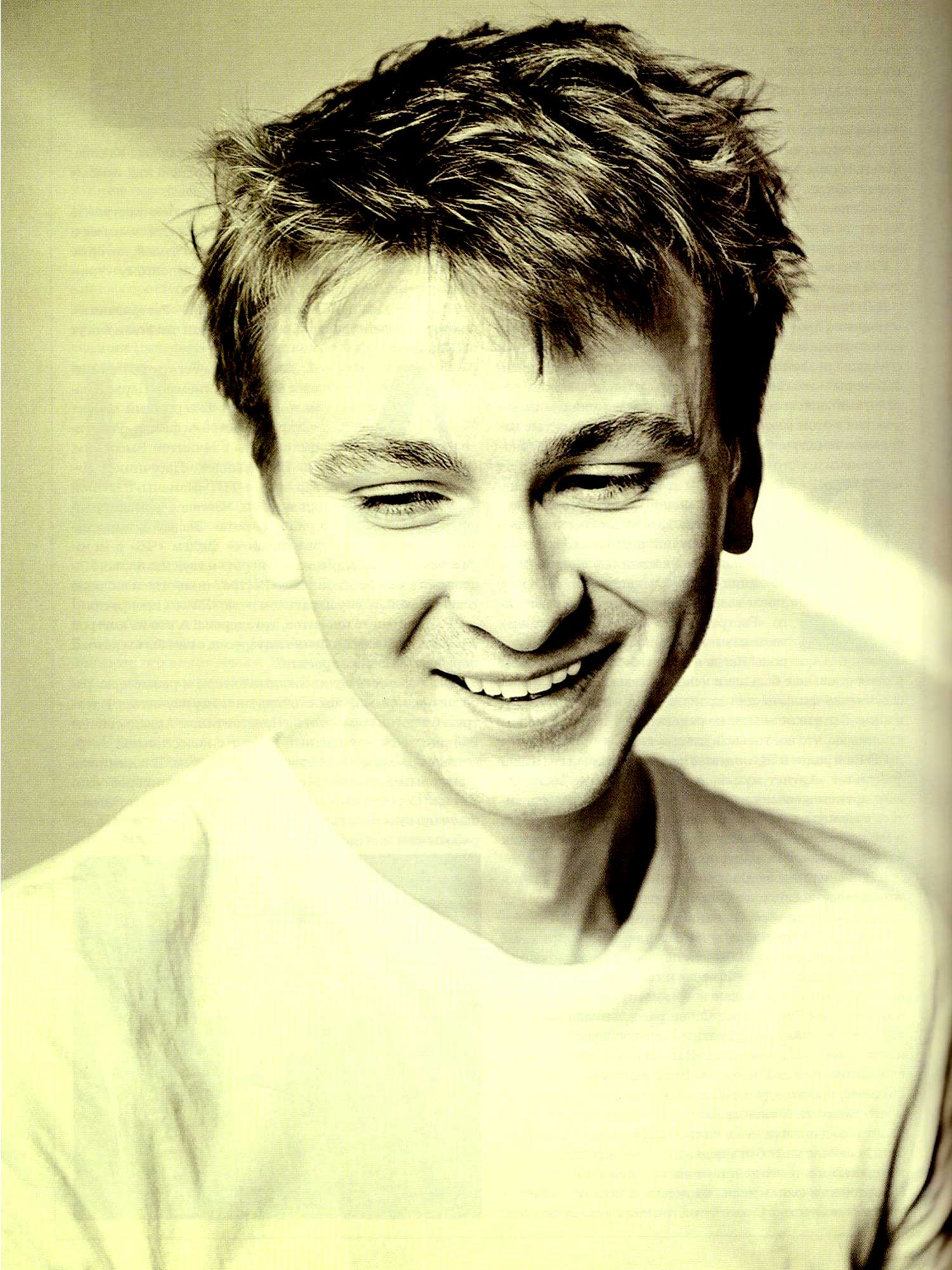«Radius Goroda» magazine
Circulation: 50'000 copies
Artem Lyskov:
“Working as an actor helps you get rid of cliches”
Back in his student days theatre and film actor Artem Lyskov became interested in the genre of musical theatre that was new in Russia and almost immediately after graduating from the Boris Shchukin Theatre University he went to the USA to study this genre in its homeland. He wasn’t afraid to leave his country and quickly escalating career and moved to New York for two years where he studied at the Lee Strasberg Theatre and Film Institute, becoming a graduate of the Broadway school for musical theatre actors. After two years of living in the USA Artem came back to Russia to continue his acting career: now he plays the main character in the musical “Embezzlers”, acts in films and teaches at his alma mater: the Boris Shchukin University.
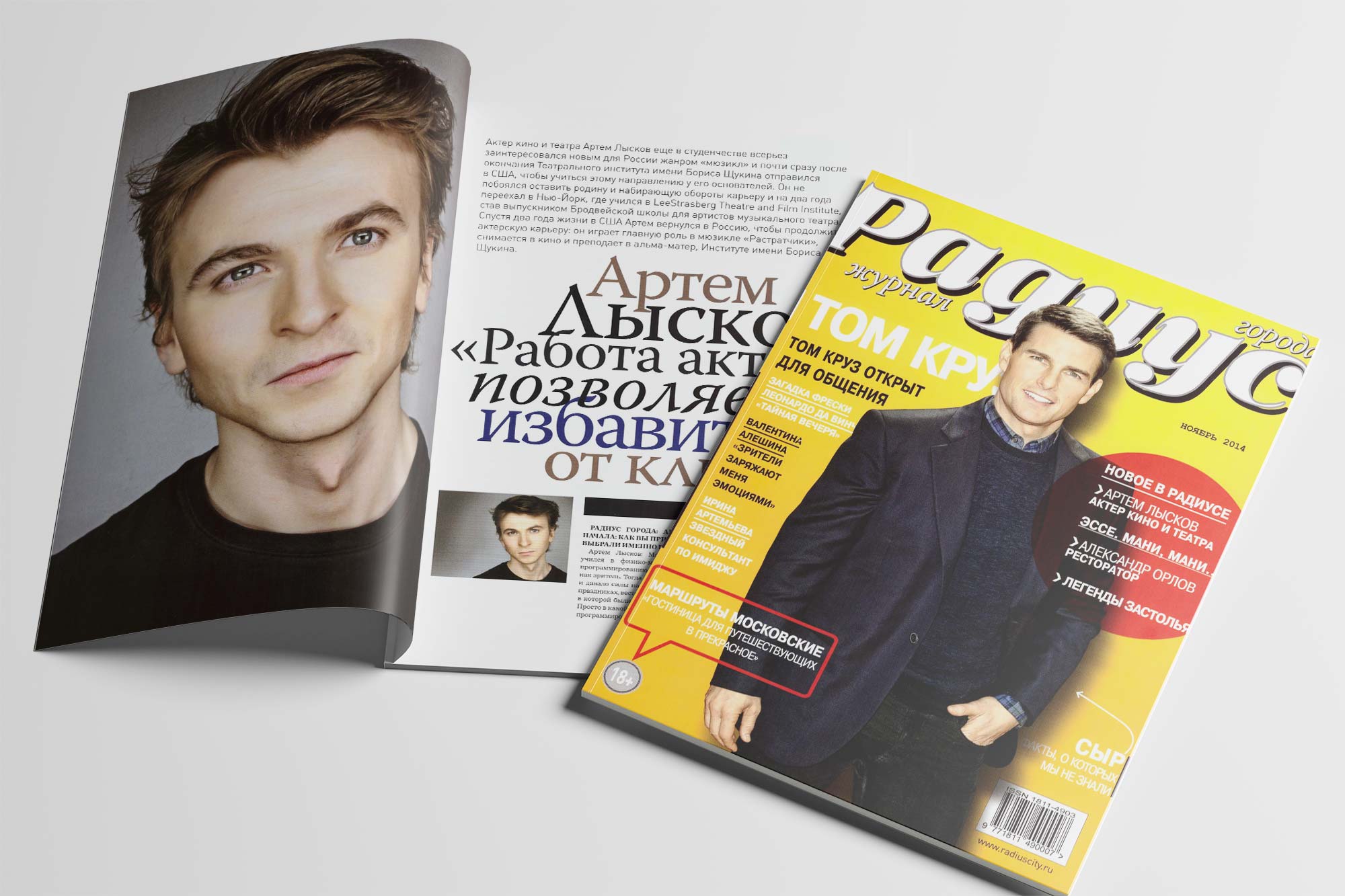
- Artem, we’d like to start from the beginning: how did you decide to become an actor and why did you choose Shchuka?
- My way into the acting world was not ordinary! I studied in a physical-mathematical class, won programming contests and was absolutely happy. When I was around 10 I started going to theatres as a viewer. Back then I didn’t have dreams of being an actor yet. It was fascinating to me, it entertained me and gave me energy to pursue my future. It was much later that I started participating in school events, hosting them, but it didn’t distract me from my “other life” that was full of mathematics, computers and other technical subjects. It’s just that one moment I realized that I wasnted to do theatre more than programming.
The Shchukin college was always symbolic to me! I knew the actors there were not just actors, they were student-actors who could do anything! A dancing show? – Easy! A musical show? – Even easier! Drama? – That’s our profession! The actors’ “synthetics” attracted me with its bright colors. Also, I think, the school itself picked me to be its student, not the other way around. I enrolled the year Shchuka was celebrating its 90th anniversary and now, 10 years later, in the year of its 100th anniversary, the school picked me again, but this time as its young teacher. I couldn’t even dream of it when I was a freshman.
- Russian theatre acting school has always been strong, so why did you go to study in America?
- Russian theatre school is truly considered the best one in the world. Drama theatre is very strong in Russia but it doesn’t apply to musical theatre or movies. The art of filming is taught more professionally and accurately in the West. There’s no other way, the best film industry is in Hollywood and the best musical theatres are on Broadway in New York and on London’s West End. They know the specifics, the base for the business and they’ve had many years of experience.
In America movies and theatre have become a form of art a long time ago, and it brings them a lot of money. That’s the reason the market changes and it reflects on the actors. Finding a job for an actor, looking good in the eyes of an employer, being successful at a casting – they teach all of this abroad, but, unfortunately, not in Russia. That’s why I decided it was worth it studying musical theatre in the US, and I was right. Now I can say those were the best years of my life!
- You left Moscow when your career was blooming. Were you afraid that you’d have to start over again when you return?
- At that moment I had just finished doing a flagship project on Channel STS: everybody knew about “Ranetki”, even those who had never seen it. Being a part of it was great luck. That’s why leaving wasn’t easy, it seemed like that kind of popularity would bring me parts and a lot of jobs, a new era would come for me. On the other hand, all the actors had the “ranetki stamp”: wherever I went they only saw the schoolboy from the show in me. The best way to end it is to let them forget about you for a while, and I got this chance. The adventure called “enrolling in an American theatre University” was a success and I found myself in the center of Manhattan, in the glory of Broadway for the next couple of years. I was happy!
- You played a schoolboy in “Ranetki”, even though you were a Theatre University last year student. How did you get involved with that project?
- My agent called me and asked me to meet the director to discuss the new project. I didn’t know exactly what kind of filming they were planning, and there was no casting per se. My type was suitable for them and my participation was confirmed on the very same day. At first the part of Kolya Platonov wasn’t promising at all. In the first 20 episodes he was just the main character’s classmate. But when they realized the show was getting popular and decided to continue filming it the other characters started developing. The next season I became one of the main characters and Kolya got his own interesting twists and turns and his friendship with classmate Zhenya Alekhina (Zhenya Ogurtsova) escalated into romance.
- Would you agree to a similar project now or are you afraid of becoming a one-type actor? Or maybe you’ve got a dream role?
- Being an actor allows you to get rid of cliches, so I don’t want to set up artificial frames for myself and I don’t have any particular dream roles. I am open to everything. I am not afraid of TV series, on the contrary, I would love to be a part of a similar project. Playing in a famous sketch comedy can bring other parts that will give me the opportunity to open up from another perspective.
- How did New York receive you? What was the hardest about living there?
- New York received me like a real American – with a big smile and happiness in its eyes, but also with difficulties: starting with not knowing the language and ending with financial issues. I am grateful to my friend who was translating all the classes in my ear during the first three months. When I was applying for the University I lied to the management and didn’t tell them I didn’t speak English well. I started speaking fluently only after six months there.
The schedule was very intense, but I liked it. I am very grateful to my teachers who taught me to believe in myself, let me know I had my own creative way. I also understood what the mysterious “American dream” meant – it means you can dream about anything and you know it’s going to come true!
- What is the difference between Russian and American education systems?
- The education systems are different in practically every way! I was amazed at how everyone in America was happy with any result. Everytime you are on stage it’s an important step, it’s your personal success, your experience, your victory. In America they always praise you at first, and only later they’ll mention the drawbacks you have to pay attention to to make sure the next time will be better. It’s very hard at first for a Russian person – in our childhood and school years we get used to being scolded and told it’s not going to work out. It’s different over there. That is probably the global difference of mentalities. In the US children are free from prejudice, they are not afraid to make mistakes – I think it’s amazing! I have to say, though, that I am not in any way saying it’s bad in Russia – no, it’s just different here. And now as a young starting teacher I realize it’s impossible to always praise everyone. Everyone is unique: it might be harmful to one, but useful to another. Another interesting feature of their education – you form your own schedule! It’s an astonishing thing and during my first semester I didn’t understand how it was possible – choosing the subjects you want to attend and the teachers you like. All of these factors teach you to be responsible for your knowledge and future. For example, you realize you need to work on your dancing this semester – and voila – you add more dancing classes to your schedule, and the next semester you concentrate more on the acting improvisation – it develops you so much, you have no idea!
- Did you get a chance to do professional work in the US or did the studies take up all of your time?
- I was lucky to be a part of a real theatre project in New York, it was the musical “The threepenny opera” by Kurt Weill. There was a real Broadway team of directors, great acting partners – American actors, one of the main parts in English – these are the most important aspects of my participation in that show. I was in that project after graduation because during studies I simply had no spare time.
- And yet you didn’t stay in New York and decided to come back to Moscow.
- Yes, I wanted to apply my new knowledge in my country and, naturally, I wanted to do a musical in Moscow. My wishes were heard – almost immediately after coming back I went to the casting of the Moscow Musical Theatre’s “Embezzlers” and soon enough I got the main part there! When I returned to Moscow I got even more work: I pursued my dream and started voice acting for foreign films, started participating in a lot of movies. I couldn’t help being happy about it and in moments like this I realize that everything is in my hands.
- Your home University – the Shchukin University, - opened up a department for musical theatre actors a year ago. You are one of the teachers and you share the knowledge you received in Shchuka and in the US schools with your students. Tell us how you got invited for this position. Were you nervous?
- Another reason I was offered this job is me being one of the few people here to have a profile education in American musicals. Of course this was an exciting step for me: I didn’t have any teaching experience, I was worried about how the students would accept me, how I should act and so on. But I remembered a teacher from the American Lee Strasberg University: the amazing Susan Grace Cohen told us that when she had started teaching and had been nervous one of the older colleagues had told her: “You enter the classroom and do your job.” So I try not to think too much, I just come in and do my job. I am protected by my teacher Mikhail Petrovich Semakov who took me in to his course 10 years ago and taught me to be an actor, and now he’s teaching me to be a teacher. It’s thrilling but interesting and I really like it. I feel enough strength to let my students know what I think, explaining is an art too. Ever since I became a teacher I started improving as an actor. When I explain the basic elements of acting to the starting actors I remind myself of them one more time for it is very important to remember the basics. What I want to say is if someone dreams of studying in a theatre University – it is already an achievement. Go pursue your dreams. It’s important! I don’t meet a lot of people who sincerely dream of something, so – hooray – move only forward.
- Artem, you mention the musical “Embezzlers” where you play one of the characters, where else can our readers see you?
- 2014-2015 are full of premieres with my participation: the 12-episode project “Elder sister” and the movie “Rehearsal of life” with Nikita Vysotskiy will air on Channel One. “Beekeper 2: The fugitive” will air on NTV, “Betrayals” with elena Lyadova – on TNT, a comedy show “IT-company” – on “Zvezda”. The movie “ChB” with me in it will be in cinemas in Spring. I also keep acting in two musicals of the Moscow Musical Theatre – “Embezzlers” where I play the main part and the musical revue “Life is beautiful”.
- You’ve got a lot of projects, that’s great! Which actors and directors are especially interesting to you, who would you like to work with?
- There are outstanding actors and directors here, working with them can teach you a lot. In the heatre I would like to work with Konstantin Arkadievich Raikin, he Is a successful actor with colossal energy. In the movies I want to work with Sergei Bezrukov, Vladimir Mashkov, Evgeniy Mironov. When it comes to directors – it’s Kirill Serebrennikov. I intuitively feel he could help me a lot as an actor. I saw almost all of his works: I am interested in them and I can relate to them.
